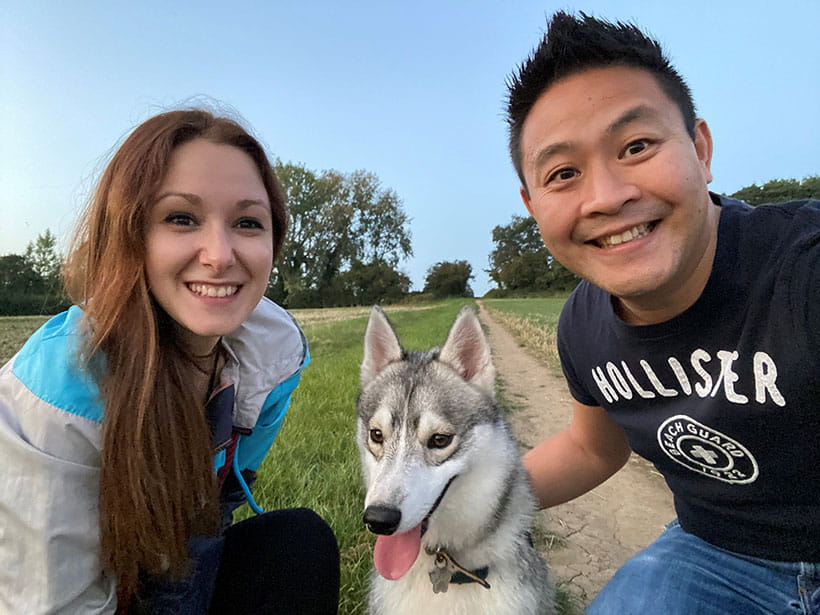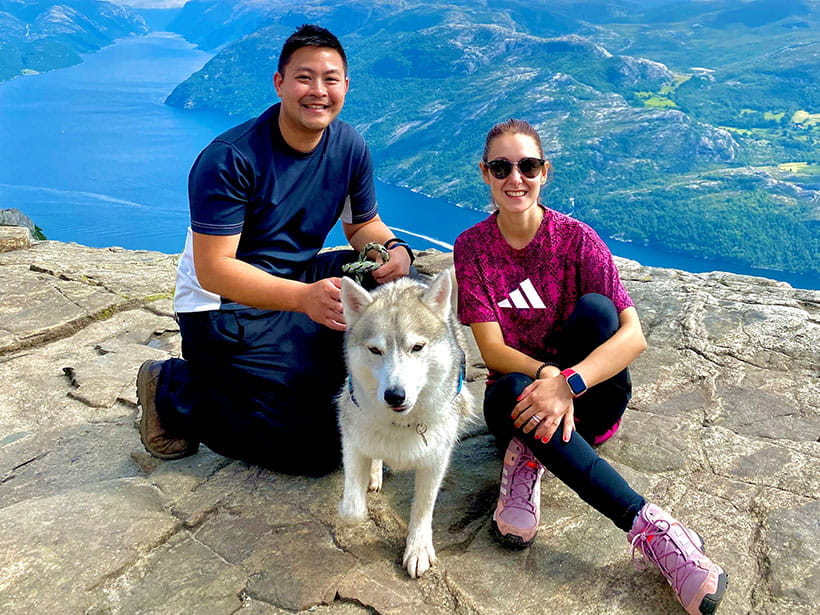I'm Kai, and I'm an ST6 in urology. Last year, my wife (a nurse) and I decided to take a 12-month career break from the NHS and travel the world with our dog Kevin.
After years of studying, exams and shift after shift, not to mention working through COVID-19, we were feeling burnt out like so many others. So we made the decision that our own wellbeing should take priority, and started to prepare to take an approved period of time out of work and specialty training to pursue our dreams of travelling the world and to spend time with loved ones.
Doing something different to everyone else (or getting off the 'medical conveyor belt') will always require self-reflection, a bit of inspiration and some courage. Especially when you realise just how long a doctor's career path actually is. It's no wonder that it can take its toll on the body, and many of us, including myself, put our exhaustion down to 'just being part of the job'.
What is burnout?
The body's response to being exposed to stressful situations is to release hormones such as adrenaline and cortisol, the well-known fight or flight response. This is usually good for short, limited stressful situations.
Burnout, however, is the result of constant exposure to a stressful environment. Doctors may not even realise they're suffering from the symptoms of burnout, which include irritability, feeling unappreciated, disengagement, feeling exhausted, becoming more cynical and much more. Read more about the symptoms here.
Doctors who are suffering from symptoms of burnout (whether they're aware of it or not) are 2.2 times more likely to make mistakes - which is neither good for the doctor or patients.
A career break can help you take a step back and prioritise your own mental health and wellbeing, hopefully allowing you to go back to work feeling invigorated and energised.
How do you take an approved career break from the NHS?
For doctors in specialty training (who have done at least 12 months), the first thing to do is to have a conversation with your clinical and educational supervisors letting them know that you wish to take a career break.
You then inform your training programme director in writing (email is fine). It's best to try and give as much notice as possible - I informed mine a year in advance - however, most contracts and guidance from Health Education England (HEE) state you should give at least six months' notice, and three months' notice to your current/next employer in order to meet the Code of Practice requirements.
You'll need to fill out a few specific forms depending on which trust you're working in, as well as those associated with HEE that require various signatures from postgraduate deans and supervisors, etc. It took me around a month or so to get all the required paperwork signed off.
For my wife as a nurse, it was a bit more straightforward. She had a conversation with her line manager and filled out the NHS trust-specific paperwork that was required for an approved one-year career break. (Each trust has its own rules and timeframes, so it's best to research this first.)

Can you still locum during approved time out of training?
In short, yes, although one of the biggest reasons for a career break can be to take a step back from medicine. If you do decide to locum, you would need prior permission from your current workplace to work in another clinical capacity, such as taking on locum work.
If you decide to continue to work clinically, get tailored advice from your medical defence organisation (MDO) to make sure you know what is required of you for your GMC registration. There's a few more things to consider when working overseas, such as registration in that jurisdiction.
Is there a 'good' time to consider a career break?
It will be whatever time is right for you depending on your circumstances. My advice would be to occasionally reflect on your current situation and ask yourself:
- is there something else that should take priority in your life right now other than work?
- are you suffering from any of the signs of burnout?
- are there other opportunities or paths that you want to pursue but can't due to work?
If the answer is yes to any of these, then it may be worth considering whether a career break is the right thing for you. This may be in the middle of your training or perhaps at a natural gap, such as between foundation and core training.
There is a general worry that people who take time out will become de-skilled, especially within the surgical specialties. However, there are resources in place for situations such as these called SuppoRTT, which are offered to everyone who has had time away from work or training, like those that return from maternity, paternity or adoption leave. You can also stay up to date by doing some reading around your specialty from time to time.
Do I still need a medical defence organisation during my break?
If you're not planning on working clinically, then no, but it's good to remember that although you won't be employed clinically, you'll still be a qualified doctor (if you choose to have a break after your studies) and may find yourself offering help in an emergency situation.
Your medical defence organisation, like the MDU, will usually provide worldwide medical indemnity for good Samaritan acts as part of your membership. Although there is no legal obligation to do so, the GMC's guidelines state that doctors must offer help in an emergency. Medical students aren't strictly bound by the same ethical obligation to help as qualified doctors, but might still be faced with an emergency situation where they may feel obliged to help.
Remember, as long as you're on the GMC register, it is possible for the GMC to investigate your fitness to practise, even if you're not doing clinical work at the time.
If you're still a member of your MDO, you can ask for advice and support in these situations.
Where can I find more information on taking a career break?
The Health Education England (HEE) and the GMC websites are a good place to start, as well as having a look through your contract to check what your employer allows. Since we're also figuring things out as we go along, we've tried to provide some information on the practicalities of a career break (as well as things we didn't foresee) on Instagram to help others (@Nomadic_Medics00).
Where I am now
We're six months in, and it's been one of the best decisions we've made. We started by buying a motorhome to give us the freedom to travel more easily, and so far we've travelled to 17 different countries, hiked up several mountains (some more easily than others!) and been to places we never thought we'd visit, sampling different foods and cultures along the way.
Spending time with loved ones and recharging has really helped to put life in better perspective. Looking back, I can see that I wasn't aware I was suffering from some of the signs of burnout. It wouldn't be that uncommon since I am in the final stages of training, but on reflection, if I were to have carried on and added the extra pressure of preparing for the final FRCS exams, I don't think I would have given myself or my patients the care they deserve. A career break couldn't have come a better time. In fact, it also gives me the opportunity to prepare for the exams in my own time if I want to, without the added pressures of trying to fit study time in between shifts.
Ultimately, everyone has a right to prioritise their own wellbeing and mental health, so it's always nice to know that a career break can be an option for doctors (and nurses), even those in specialty training.

---
MDU advice
Kai mentions, quite rightly, that you should get personalised advice if you're looking for work as a doctor while on a career break, and permission from your trust. In addition, all doctors need to be aware of the requirements placed on them by the GMC.
If you do not yet have full registration, you must work only in the foundation programme. If you have full registration but have not yet had your first revalidation (as for most trainees), you will have an APS requirement on your registration and must have a connection to a designated body.
If you don't have a connection to a designated body (check on the GMC website) then you should stop all practise in the UK until you make a new connection.
You must also only work in an approved practice setting (APS). All designated bodies are APS. An APS provides supervision, support, regulatory assurance and can identify and act on concerns about a doctor's fitness to practise.
If you want to locum outside your designated body, make sure your educational supervisor is aware, and comply with any reporting requirements. Take work only if it is within your level of competence.
MDU members are welcome to contact us for individual advice.
This page was correct at publication on 15/03/2024. Any guidance is intended as general guidance for members only. If you are a member and need specific advice relating to your own circumstances, please contact one of our advisers.
by Kai Chi
Kai Chi is 39 years old and a urology ST6. Originally a musician, he switched to the sciences at university for his BSc and MSc before completing graduate entry medicine, which included spending two years in Cyprus and two years in Israel. His wife Ana is an NHS obs and gynae nurse, and they have a dog called Kevin. They both share a passion for travelling, hiking and food.